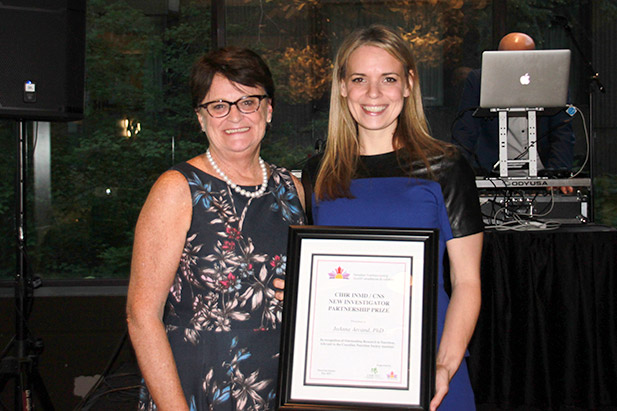Nutritionist JoAnne Arcand’s research expertise lands a national award
University researcher pushing new frontiers in public health policy
July 12, 2017

When it comes to nutrients relevant to cardiovascular disease prevention and management, award-winning University of Ontario Institute of Technology researcher JoAnne Arcand, PhD, offers plenty of food for thought. Dr. Arcand has extensive research expertise in dietary sodium intake in Canada and our collective actions and perceptions about sodium.
“Almost all Canadians consume far too much sodium—which can be found in almost all areas of the food supply, especially packaged and restaurant foods,” says Dr. Arcand, an Assistant Professor with the university’s Faculty of Health Sciences. “My research explores the implementation of nutrition recommendations in primary health care, such as new dietary management tools for the prevention of hypertension and heart failure.”
Sodium increases the risk of high blood pressure, stroke, and cardiovascular and kidney diseases. Dr. Arcand’s work includes some of the first studies examining the health effects of sodium in people living with heart failure. Some of her more recent work, in collaboration with family doctors, focuses on managing and preventing high blood pressure by studying the sources of sodium in the Canadian diet.
Dr. Arcand’s impressive research portfolio has earned her one of the highest possible accolades from colleagues across the country. She is the 2017 recipient of the New Investigator Partnership Prize offered by the partnership of the Canadian Institutes for Health Research’s (CIHR) Institute of Nutrition, Metabolism and Diabetes (INMD), and the Canadian Nutrition Society (CNS). She received the award at the CNS Awards Banquet in Montreal, Quebec on May 27.
While there has been a lot of public talk about salt in recent years, Dr. Arcand says sodium-reduction response by the food industry has generally been sluggish. As progress continues on that front, she says technology will play a key role in educating the public on how to make smarter food choices.
“Many people know Canadians consume high amounts of sodium, but they tend to think it’s other people who have a problem, and not themselves,” explains Dr. Arcand.
This led Dr. Arcand to develop the Sodium Calculator, an online tool that quickly estimates the amount and sources of sodium in the diet. Internationally, the World Hypertension League has recognized her research contributions. She also recently received an Emerging Research Leaders grant from the Heart and Stroke Foundation of Canada.
“Even in hospitals, patient menus sometimes contain sodium levels well above the tolerable upper level,” says Dr. Arcand. “Some meals in health-care settings contain inadequate amounts of calories, protein, fruits and vegetables. There is a long way to go, but from patients to health-care providers to policymakers, people are really starting to get the message about how much sodium we are consuming, the negative health outcomes and the need to take action.”
Selected research initiatives by Dr. Arcand:
- A national survey of family doctors exploring current barriers to implementing nutrition recommendations for patients with hypertension.
- A study to determine optimal approaches to implement electronic dietary screening tools into a busy primary care workflow.
- A randomized controlled trial to determine if the Sodium Calculator is effective in increasing sodium awareness and reducing dietary sodium intake and blood pressure (or change in blood pressure medications) in patients with hypertension. A grant from the Canadian Stroke Network as well as CIHR supported development of this evidence-based rapid electronic dietary sodium assessment tool.
- Designing and developing mobile nutrition education apps for Ontario schoolchildren, and evaluating policies to reduce population sodium intake and address childhood obesity in Canada and Latin America. Four Ontario school boards will implement the prototype before commercialization for broader reach.
- Knowledge translation: Cost-effective population-level interventions to address nutritional problems in the general public and at-risk populations.



